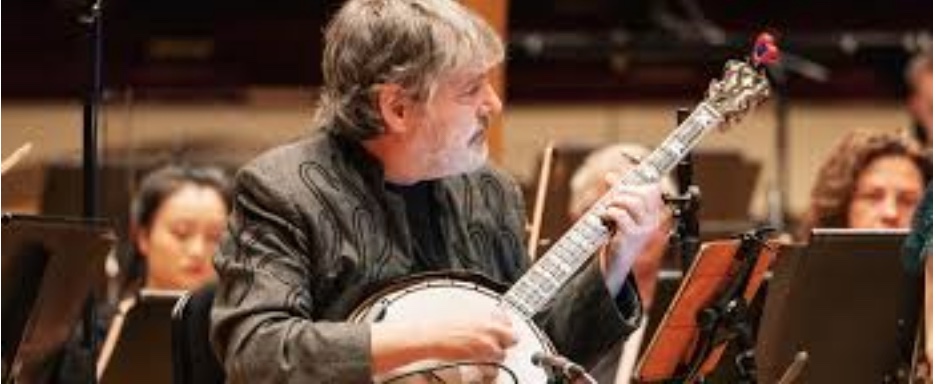by Daniel Hathaway
Kent/Blossom Festival Young Artists performances begin in a number of locations on Friday (2 pm at Hudson’s Laurel Lake Retirement Community & 7:30 in Ludwig), Saturday (2 pm at Hudson Library) & Sunday (2 pm at CIM’s Mixon Hall & 7:30 in Ludwig).
Banjo sensation Béla Fleck (pictured) joins conductor Brett Mitchell & The Cleveland Orchestra on Saturday at 7 at Blossom for Fleck’s own arrangement of George Gershwin’s Rhapsody in Blue, plus American music by Leonard Bernstein, Samuel Barber & William Grant Still.
Ohio Light Opera continues its rotation of its first three productions in Freedlander Theatre at the College of Wooster: The Sound of Music (Friday at 2 & Sunday at 2), Guys and Dolls (Saturday at 2 & Tuesday at 2) & Me and My Girl (Saturday at 7:30).
A Lunchtime Carillon Concert by Sheryl Modlin begins at 12:15 Friday from the McGaffin tower in University Circle.
And a concert at 3 pm Sunday at Lake View Cemetery Community Mausoleum celebrates Cleveland’s forgotten composer, guitar hero, and abolitionist, Justin Holland with 280 years of chamber music by Black composers performed by Damian Goggans (guitar) & Cleveland Orchestra members Liyuan Xie & Isabel Trautwein (violins), Eliesha Nelson (viola) & Tanya Ell (cello).
For details of upcoming concerts, visit our Concert Listings page.
WEEKEND ALMANAC:
By Jarrett Hoffman
At a meeting organized by the Rochester Ladies’ Anti-Slavery Society on July 5, 1852, Frederick Douglass delivered his speech What to the Slave Is the Fourth of July? — considered by many to be the greatest piece of anti-slavery oratory in American history.
Composer Dorothy Rudd Moore turned to that prominent abolitionist as inspiration for her opera Frederick Douglass. One powerful moment that critic Tim Page noted in his review of the 1985 premiere is a musical setting of excerpts of that famous speech — “when Douglass contemplates the bitter irony of a pre-emancipation Fourth of July,” Page writes.
Watch a performance of the aria by baritone José Pietri-Coimbre and pianist Richard Liebowitz from 2019. You can also read about the speech here from the Library of Congress, read the full speech here from BlackPast, or listen to five descendants of Douglass reading and responding to excerpts of it here.
By Daniel Hathaway
On July 6, 1937, Russian pianist and conductor Vladimir Ashkenazy was born in what is now Nizhny Novgorod. A frequent guest at Severance Hall, Ashkenazy recorded all of the Beethoven concertos from the keyboard. He talked about his life and career with host Zsolt Bognár in the 62nd episode of Living the Classical Life. watch the interview here.
And on July 6, 1952, composer Stephen Hartke was born in Orange, New Jersey. Two years before he became head of Oberlin’s composition department in 2015, he won a Grammy for his Meanwhile — Incidental Music to Imaginary Puppet Plays. Listen here to a performance of the work by eighth blackbird on Naxos. And listen to a podcast interview in Off The Podium with Tigran Arakelyan here.
Considering the withering heat and humidity of the past few days, doesn’t an afternoon in a cool, dark movie theater sound enticing? Or perhaps just a couple of hours on the couch in the A/C enjoying the music of one of the world’s premier film composers — Ennio Morricone — who died on July 6, 2020 at the age of 91.
Although Morricone never left Rome and never learned to speak English, he created some 400 film scores and a hundred classical compositions. Click here to listen to 39 excerpts from his oeuvre.
Among the other aspects of his intriguing life, Morricone was a skillful chess player who once held grand master Boris Spassky to a draw in a simultaneous competition involving 27 players, of which he was the last man standing.
If you find yourself discussing great women in the history of the U.S., a fitting topic would be an opera inspired by one of the most important names in abolitionism and women’s rights. The work in question is TRUTH: An American Opera about Sojourner Truth by New York-based composer Paula M. Kimper (left), who was born on July 7, 1956.
The opera was premiered in 2012 at the Academy of Music in Northampton, MA, while its chamber version was first heard at the 2013 New York International Fringe Festival in a performance by the Paula Kimper Ensemble. YouTube offers up an album of highlights from the opera, as well as a video excerpted from Act III.
Since graduating from the Eastman School of Music, Kimper’s career in New York City has been quite multidisciplinary in nature, ranging from the theater to dance, film, and particularly opera — both as a composer and as director of the Executive Committee of the New York Opera Alliance.
Sojourner Truth is not an outlier when it comes to Kimper’s inspiration: historical figures — and literature — have played a prominent role in her oeuvre. Click here to read more about her works, all of which have been acquired by the Loeb Music Library of Harvard University.




